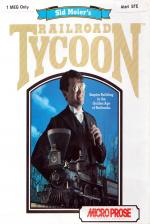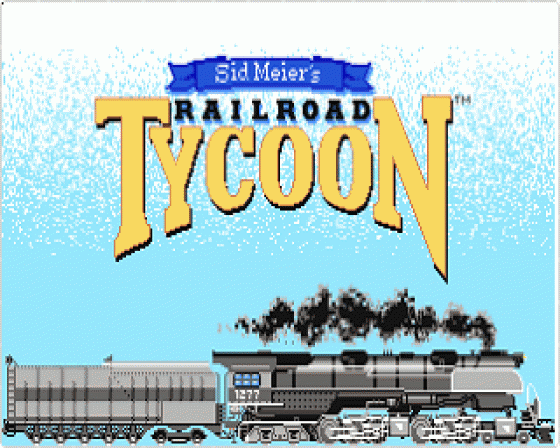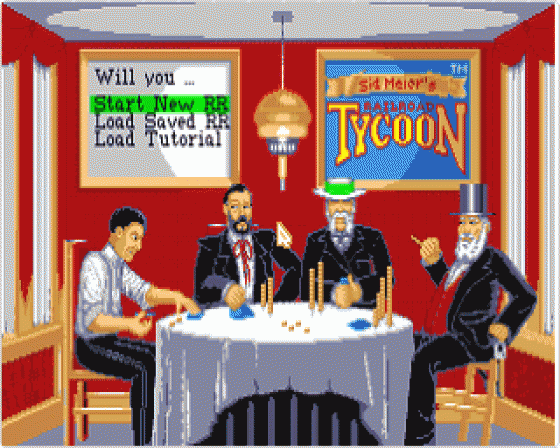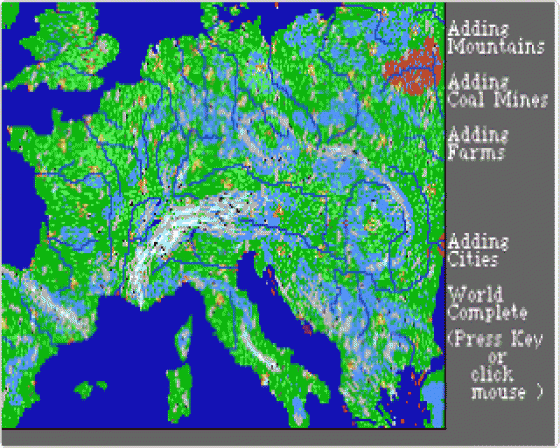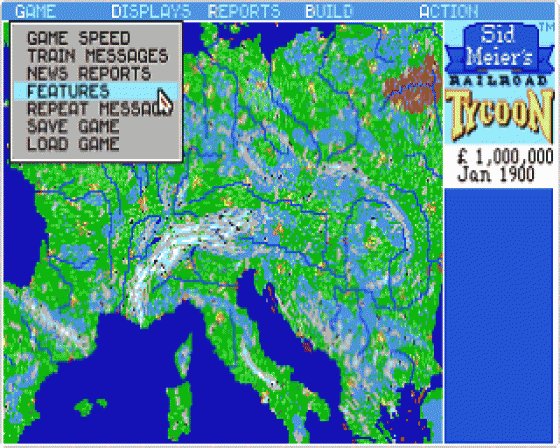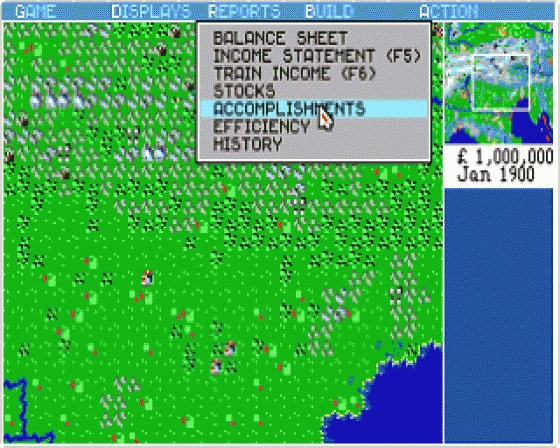
ST Format
 1st December 1991
1st December 1991
Categories: Review: Software
Author: Ed Ricketts
Publisher: Microprose
Machine: Atari ST
Published in ST Format #28
Railroad Tycoon
Ah, the golden age of steam! Huge oily monstrosities belching out scorching clouds of water vapour, burning precious fossil fuels and making a hell of racket. Not like these modern diesel things. Ed Ricketts reminisces with a tear in his throat and a lump in his eye...
Your mother always warned you it would make you go blind but you still carried on with it, didn't you? Trainspotting, that is. And now you've got 300 notebooks full of useless numbers which you can't bear to throw away because of their sentimental value.
If you were one of those anorak-clad notebook-clutching acne-ridden sad-faced bespectacled wretches who got all excited if someone even mentioned a Double 0 gauge, Railroad Tycoon is the game for you. Actually this does a grave disrespect to the game (but not to the trainspotters - yuck), because if it had to be pigeonholed, it would be as a god game.
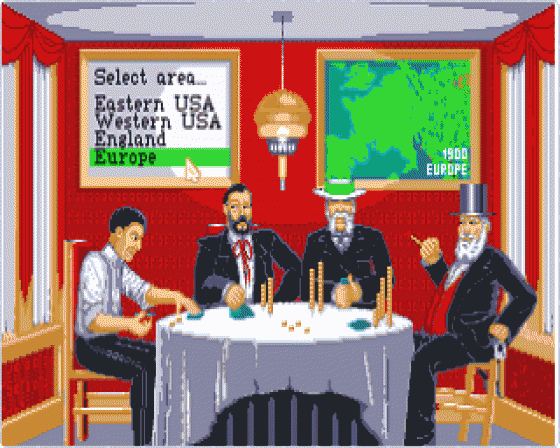
Your ultimate aim is to build a rail-roading empire and retire a rich man. Four game worlds are available: Eastern and Western USA, Europe and good old Blighty. The resources, services and goods you exploit or produce with your RR depend on the world you select. The USA has a large percentage of cattle ranches, for instance, while these are absent in Europe and England. In addition, each world begins in a different year, corresponding to the real year of railway introduction to that country. In England you start in 1830, with only a very basic locomotive to power your trains. In Europe, a game begins in 1900, when more sophisticated engines have been invented.
To earn revenue in Railroad Tycoon you transport goods, passengers and mail from a station that supplies them to a station that wants them. The receiving statin then pays your railroad for your trouble. The amount of revenue earned depends on the speed and size of the cargo you deliver. For instance, the revenue for delivering mail increases the quicker and further you can deliver it. This effect decreases with each class of cargo, so it's slightly less important with passengers, even less with Fast Freight, and so on down to Bulk Freight, which is paid for strictly by quantity - speed of delivery doesn't matter (just as in real life).
The basic unit of any railroad is, of course, track, and you usually begin by laying it from one city to another. Naturally, every piece you lay costs you. At any point along a piece of track you can build a station. Its economic radius depends on its size and so, its price. The supply and demand for a particular station is determined by the resources and industries inside this radius, so the larger the radius, the larger the supply and demand is likely to be.
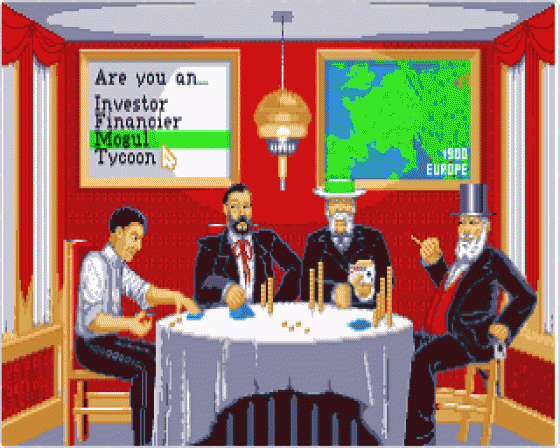
Each station (and each signal tower when you build them) has a set of signals that govern which trains are allowed to pass through, and which have to stop and wait. With the difficulty level set low, you can leave the operation of the signals to your dispatchers, ensuring that no train crashes can ever occur. At higher levels, you have to monitor the signals yourself. Although they do run safely on their own, there may be times when stepping in and changing their operation would result in the trains running faster and, therefore, more efficiently. If you're not careful this can lead to expensive and reputation-damaging crashes.
While you're trying to make an honest living, your competitors are doing the same. Again, on lower difficulty levels, you don't have to worry about them too much - they won't attempt to take you over, block your railroad or buy too many of your shares. At higher levels they do all of these things.
The graphics aren't spectacular (ported as they are from a PC) but they do display everything you need to know, although sometimes the various icons for the industries can look a little samey and necessitate some manual-flicking. The trains are incredibly cute - though small - and each has its own little puff of steam as it chuffs its way around the track. The linking screens are as colourful as they can be within their limitations (it's hard to make a list of figures look interesting) and the world maps are convincing enough. Every time a train passes through a station, it gives a small whistle to let you know. As you clock up the revenue, you hear the clatter of coins - well, they're supposed to be coins but they sound more like a doorbell. And yes, there is a chuff-chuff noise, but it's distinctly ropey and only heard when you start a new train.
Verdict

MicroProse have a habit of producing massive games with manuals at least the size of Wales and fiendishly complex gameplay. This is one of them. Railroad Tycoon's manual includes a complete history of railroading, an explanation of how a steam engine works and biographies of the great past tycoons. Oh, and it tells you how to play the game too.
Railroad Tycoon, more than most, is a game that benefits from careful manual study and lots of practice. Even on the lowest difficulty level there's a lot to learn and your first attempts at a railroad empire will probably end with you in ruins. When you eventually become familiar with the concept of supply and demand, where to build track and which trains to run, the game really comes into its own.
One of the game's main strengths lies in its flexibility. If you just want to criss-cross the whole of America with your railway, you can concentrate on building. If you're more interested in stock market dealing, you can let your competitors do the work and then take them over. Because the game map is randomly generated for each game, no two games are the same and so you're always forced to change tactics.
Railroad Tycoon is not a game for the faint-hearted or those who like quick starts. Your time and effort investment will be well rewarded, however, when you will find a hugely enjoyable, complex and fascinating game lurking beneath its accountant's exterior. Trainspotters of the world unite (and buy this game) - you have nothing to lose but your acne and your anoraks!
In Brief
- Similar to Sim City but - heretical though this sounds - more complex and enjoyable.
- The first game to incorporate trains in a real game with real interest.
- Graphically, could be Sim City's clone.
- 1MByte only - double sided drives.
Other Reviews Of Railroad Tycoon For The Atari ST
Railroad Tycoon (Microprose)
MicroProse's simulator has more bells and whistles than Casey at the throttle of the Cannonball Express. Kati Hamza hitches a ride.

